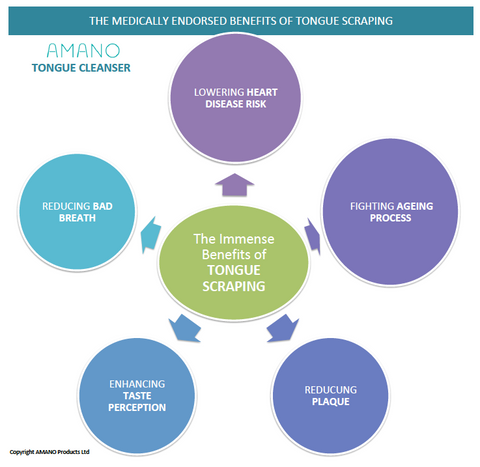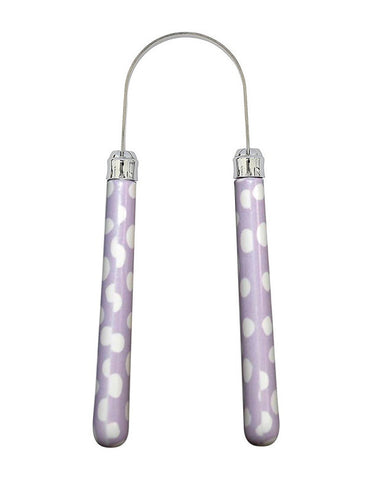Tongue cleansing has been medically shown to improve both oral care and wider health issues.

The oral care benefits:
Our tongues are almost a third of the surface area of our mouth. They are a rich surface of papillae that has been likened to a deep-pile carpet. That makes them an excellent trap for decaying food debris and bacteria.
Medical evidence shows that this cocktail will:
- Create bad breath, plaque and dental decay.
- Whilst clogging the tongue’s surface will reduce our taste sensitivity.
The benefits of tongue cleansing are thus:
It reduces bad breath
“Tongue bacteria accounts for 80% to 90% of all cases of bad breath”
Source: American Association for Dental Research
“Cleaning the tongue after eating smelly, sticky, or greasy foods should be a routine oral hygiene activity, just as necessary as using deodorant or taking a shower"
Source: Dental Economics
It reduces plaque formation
“Plaque forming Streptococci counts increased tenfold after a week of not brushing the tongue"
Source: Journal of American Dentistry
It reduces tooth decay
“ A reduction in tooth root caries will be achieved”
Source: Australian Dental Journal
It refreshes the palate - enabling our taste buds to function more effectively
“A dirty mouth cannot taste the subtle flavours in good food”
Source: Journal of Prosthetic Dentistry
“Tongue cleaning, especially with the scraper, improves taste sensation, (there were) significant improvements for quinine and sodium chloride"
Source: Journal of Clinical Periodontology
The wider health issues:
A good oral hygiene regime is actively recommended – including cleansing the tongue (since it represents one third of the mouths surface area), because:
"It reduces unfriendly bacteria entering the stomach and blood stream"
Source: Biomedcentral Oral Health
"It reduces the threat of heart disease - because of the link between poor oral care, periodontal disease and the consequential increased risk of cardiovascular disease"
Source: British Medical Journal
"The presence of periodontal disease has been related to diabetes, coronary artery disease, and stroke. The tongue provides a major source of organisms for these local diseases and may potentially have overall systemic effects"
Source: Dental Economics
And specifically tongue scraping could be a far safer option than using mouthwashes with antiseptic
"Poor oral hygiene, the use of antiseptic mouthwash or antibiotics can kill commensal bacteria and disrupt nitric oxide production putting patients at risk for CVD" (cardiovascular disease)
Source: News Medical Life Sciences (August 2017) Dr Nathan Bryan, Baylor College of Medicine, Texas, USA
Video with kind permission of Dr Nathan Bryan
Tongue scraping is even helping to fight the ageing process:
(by stimulating more Nitric Oxide production).
According to research by Dr Nathan Bryan, a specialist in molecular and human genetics from Baylor College of Medicine, Texas, USA:
“Regular tongue scraping will enable 'good oral bacteria' to produce more Nitric Oxide. Nitric Oxide (NO) plays a crucial role in helping Stem Cells function efficiently. Stem Cells role is to heal the ageing body, helping to regenerate damaged or old cells”
Source: The British Dental Journal
"At its core the ageing process is all about blood flow. Having adequate Nitric Oxide is a key part of maintaining open and flexible blood vessels. It’s a matter of simple fluid dynamics that a thinner-walled and more flexible tube requires less pressure to push a given volume of liquid (blood) through it"
Source: Nutra Ingredients USA







